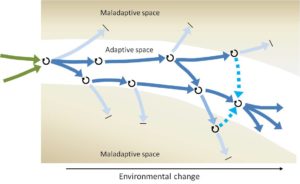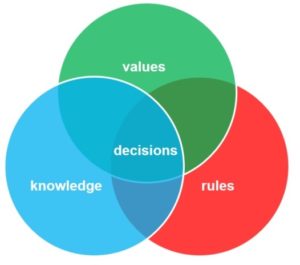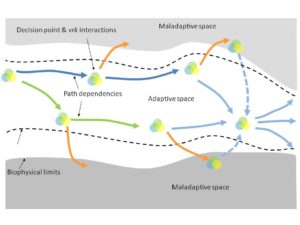Core concepts
Decision Timing: Pathways
Thinking about the timing of decisions along a pathway helps people frame adaptation as a series of decisions over time instead of a once-off choice. Adaptation options selected now may become ineffective or even maladaptive in the future. Thinking about decision timing draws people’s attention to the importance of path dependency in adaptation decision-making. This helps people understand how important it can be to take a long-term perspective in order to avoid inadvertently setting out along an undesirable path.
Stafford Smith, M. S., Horrocks, L., Harvey, A., Hamilton, C. (2011). Rethinking adaptation for a 4ºC World. Philosophical Transactions of the Royal Society A: 369:196-216. DOI: 10.1098/rsta.2010.0277
Decision Context: Values-Rules-Knowledge (VRK)
Prevailing systems of societal values, rules and knowledge define the context in which decisions are made. This means that successful adaptation requires changes to these systems to enable new decisions to be made. The interaction of values, rules and knowledge both creates and limits the set of decisions that are practical and permissible in a given decision context. People can use the VRK model to help diagnose constraints in decision processes. This means that adaptation initiatives can be reframed to reveal new approaches to developing adaptation responses to more complex problems.
Gorddard, R., Colloff, M. J., Wise, R. M., Ware, D., & Dunlop, M. (2016). Values, rules and knowledge: Adaptation as change in the decision context. Environmental Science & Policy, 57, 60-69.doi:10.1016/j.envsci.2015.12.004
Adaptation Pathways
The concept of Adaptation Pathways combines emphasizes the importance of both decision timing and decision context and frames adaptation as the evolution over time of the decision contexts that enable and constrain adaptation decisions. Instead of seeing pathways as only a sequence of decisions, the Adaptation Pathways concept helps people view adaptation in terms of the evolution of systems of values, rules, and knowledge. This helps broaden the perspective on adaptation away from inappropriately narrow framings of decision problems and helps them understand the importance of uncertainty and learning as integral parts of the adaptation process.
Wise, R. M., Fazey, I., Smith, M. S., Park, S. E., Eakin, H. C., Van Garderen, E. A., & Campbell, B. (2014). Reconceptualising adaptation to climate change as part of pathways of change and response. Global Environmental Change, 28, 325-336.
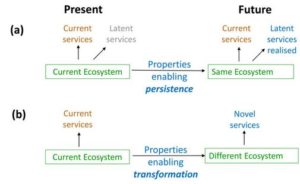 Adaptation Services
Adaptation Services
The concept of Adaptation Services help people identify the ecosystem processes and services that provide benefits to people by helping them adapt to change. For example, the properties of ecosystems that enable the persistence or transformation of ecosystem structure, function, and composition, provide important adaptation services by providing people with adaptation options. By linking ecosystems with human wellbeing, the concept of Adaptation Services can help people understand how ecosystems support adaptation.
Lavorel, S., Colloff, M. J., Mcintyre, S., Doherty, M. D., Murphy, H. T., Metcalfe, D. J., … & Williams, K. J. (2015). Ecological mechanisms underpinning climate adaptation services. Global change biology, 21(1), 12-31.
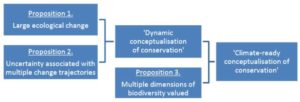
Climate-Ready Conservation
The concept of Climate-Ready Conservation helps people understand how to reframe biodiversity conservation objectives and approaches in order to accommodate the future impacts of significant climate change. As the climate continues to change the impacts on species and ecosystems will become significant and widespread and many current approaches to conservation will become increasingly difficult and ineffective. The timing of such changes is impossible to anticipate accurately, but it is feasible to anticipate which aspects might change and which might persist. This provides the basis of practical approaches for anticipating the implications for biodiversity and the ecosystem benefits and services that society enjoys.
Dunlop M, Parris, H, Ryan, P, Kroon, F (2013) Climate-ready conservation objectives: a scoping study, National Climate Change Adaptation Research Facility, Gold Coast, pp. 102.https://www.nccarf.edu.au/publications/climate-ready-conservation-objectives-scoping-study

